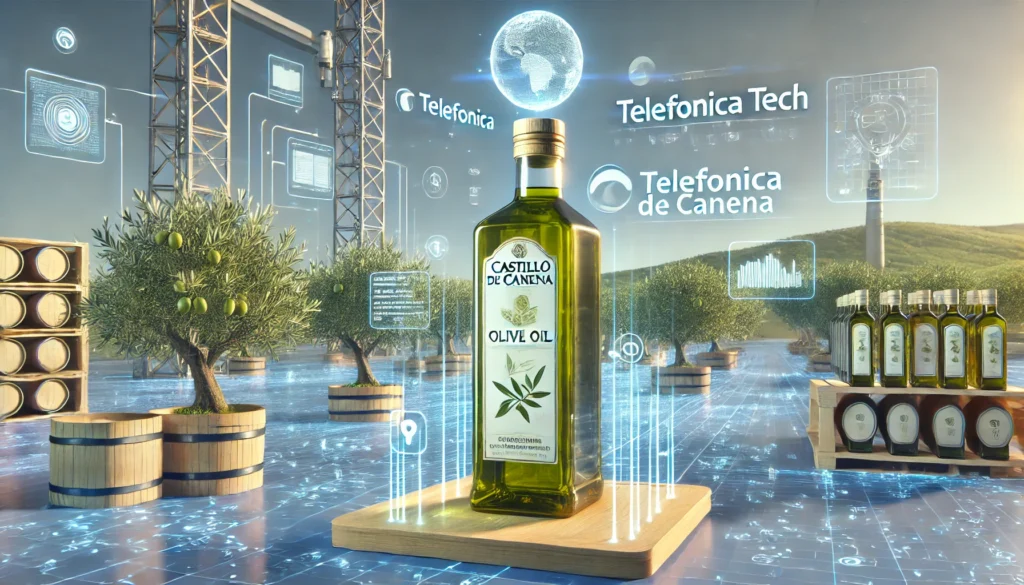In an increasingly digitalised world, the need for transparency and authenticity in consumer products has become essential. Consumers demand more information about the products they buy, especially when it comes to high quality foods such as extra virgin olive oil (EVOO). In this context, Blockchain technology emerges as an innovative solution to guarantee the traceability and authenticity of products. An excellent example of this application is the collaboration between Telefónica Tech y Canena Castle.
The Alliance between Telefónica Tech and Castillo de Canena
Origins and Objectives
Castillo de Canena, a prestigious olive company from Jaén, has decided to rely on Telefónica Tech's Blockchain technology to improve the transparency and security of its production process. Using TrustOSThrough Telefónica Tech's Blockchain managed platform, Castillo de Canena guarantees the quality and authenticity of its extra virgin olive oil to its consumers, thus combating food fraud.
Implementation of Digital Labels
The main innovation of this collaboration is the creation of unique digital labels for each bottle of oil. These labels allow consumers to access, through their mobile devices, all the relevant information about the oil production process, from the harvesting of the olives to the packaging of the final product.
What is Blockchain and how does it work in food traceability?
Definition of Blockchain
Blockchain is a distributed recording technology that allows data to be stored securely, transparently and immutably. Each block of information is cryptographically linked to the previous block, forming a chain that cannot be altered without the consensus of all participants in the network.
Application in the food industry
In the food industry, Blockchain is used to record and track every stage of the production process. This includes the harvesting, processing, packaging and distribution of products. By using Blockchain, companies can guarantee consumers the authenticity and quality of their products, offering complete and transparent traceability.
Benefits of Blockchain Technology in Castillo de Canena
Transparency and Consumer Confidence
One of the main benefits of using Blockchain in EVOO production is improved transparency. Consumers can access detailed information about each bottle of oil, which increases trust in the brand and the product.
Security and Authenticity
Blockchain also guarantees the security and authenticity of the product. As an immutable technology, any attempt at fraud or manipulation of the product is easily detected. This is especially important in the food sector, where authenticity and quality are crucial.
Operational Efficiency
Blockchain implementation not only benefits consumers, but also the company itself. Automating processes and eliminating redundant intermediaries can increase operational efficiency and reduce costs.
Details of the Implemented Solution
TrustOS by Telefónica Tech
TrustOS is Telefónica Tech's managed Blockchain platform that facilitates the implementation and management of Blockchain solutions. Castillo de Canena uses this platform to manage the traceability of its extra virgin olive oil, ensuring that each stage of the production process is recorded accurately and securely.
How Digital Labels work
Each bottle of Castillo de Canena oil carries a unique digital label. This label allows consumers to access a complete history of the oil's life cycle, from harvesting the olives to bottling. Details include the date of harvesting, the location of the estate, the milling process, filtering and inerting at the mill.
Market Impact and Future Expansions
UK Market Launch
The first bottles of oil with the new Blockchain technology are destined for the UK market. This represents a significant step in Castillo de Canena's international expansion, guaranteeing the quality and authenticity of the EVOO to British consumers.
Plans for Other Markets
After the UK, Castillo de Canena plans to expand the implementation of digital labels to other international markets. This will not only improve transparency and trust in the brand, but also strengthen its position in the global market.
Success Stories and Comparisons
Other Examples of Blockchain in the Food Industry
The implementation of Blockchain in Castillo de Canena is not an isolated case. Other companies in the food sector have also adopted this technology to improve the traceability and authenticity of their products. Examples include IBM Food Trust y Carrefourwhich use Blockchain to track products from farm to fork.
Comparison of Results
When comparing the results of companies that have implemented Blockchain with those that have not, there is a clear advantage in terms of transparency, consumer trust and operational efficiency. Companies that adopt Blockchain tend to have a better reputation and stronger relationships with their customers.
Challenges and Solutions
Challenges in Blockchain Implementation
Despite its benefits, blockchain implementation is not without its challenges. These include technical complexity, upfront costs and resistance to change from some industry players.
Strategies to Overcome Challenges
To overcome these challenges, it is essential to have a reliable technology partner such as Telefónica Tech. or the 360º consultancy Tessermint. In addition, it is important to invest in training and awareness-raising to ensure that all actors understand and support the implementation of the new technology.
Conclusion
The collaboration between Telefónica Tech and Castillo de Canena is an excellent example of how blockchain technology can transform the food industry. By improving transparency, security and operational efficiency, this technology offers significant benefits for both businesses and consumers. In an increasingly competitive market, adopting innovations such as Blockchain can make the difference between success and failure.

